 Susan Buchsbaum started her role as a mental health advocate after something she saw while in the hospital herself. “It was early in my illness and I saw something that really bothered me,” she says. She wrote a letter to the commissioner [at the Department of Mental Health and Addiction] but she didn’t send it. “I was afraid to send it, especially while I was still in the hospital. I was afraid they would lock me up and throw away the key.”
Susan Buchsbaum started her role as a mental health advocate after something she saw while in the hospital herself. “It was early in my illness and I saw something that really bothered me,” she says. She wrote a letter to the commissioner [at the Department of Mental Health and Addiction] but she didn’t send it. “I was afraid to send it, especially while I was still in the hospital. I was afraid they would lock me up and throw away the key.”
Once Buchsbaum was out, though, she decided to be more vocal about her concerns. What she is not as vocal about is her own diagnosis. “People look at it and form a stigmatized opinion and don’t see you as a person,” she says, noting that one of her diagnoses is particularly stigmatized. “They see you as a label and labels belong on cans of vegetables.”
Buchsbaum has worked in the medical field for most of her career. She was a patient advocate for DMAS for 19 years and has also worked as a radiologic technician.
“As someone who consumes medical services, I have seen things that are stigmatizing,” she says. She recalls a time when a requisition came to the radiology department to take a knee x-ray of someone who was in the psychiatric unit. “One [radiology] student was especially excited based on a stigmatized view of what people who are on the psych unit are like versus just wanting to learn,” she recalls, noting she had not self-disclosed. “I said something about not judging people based on where they are. Our job is to take the knee x-ray. It shows how pervasive the negative view of people with psychiatric disabilities or mental health issues are portrayed. Oooh, someone in the nuthouse—that was her reaction.”
Buchsbaum says stigmatized views mean that people with mental health issues are treated “like they have no validity, no license of who they are. It automatically makes you not the same as another person who has cancer.”
She sees her advocacy as one way to help educate people about what it’s like to have lived experience. “In the US we do a horrible job of educating our children in a healthy way about what mental illness is. Because there is no curriculum in school, I think kids grow up with a very stigmatized view of what mental illness is.”
Buchsbaum remains hopeful for the future, citing how views have changed about cancer. “It used to be that you didn’t tell people you had cancer because it was so stigmatized,” she says. “Cancer is no longer whispered about. My hope is that mental illness will follow the same path of stigma lessening. My true hope is that maybe someday in the future when I’m not here anymore, having a mental illness won’t be an issue.”
“I hope people come away [from hearing my story] with the sense that advocating for oneself is the most important thing,” Buchsbaum says. “It’s important to speak up.”
[su_divider top=”no” divider_color=”#fdb528″ margin=”0″]
Each day in May, you will meet a new face and a new lived experience, because #LetsFaceIt there is no one-sized fits all when it comes to our wellbeing. View past posts here.
Looking for resources or support in CT but don’t know where to start? Contact MHC’s free Information & Referral line: https://www.mhconn.org/education/information.








